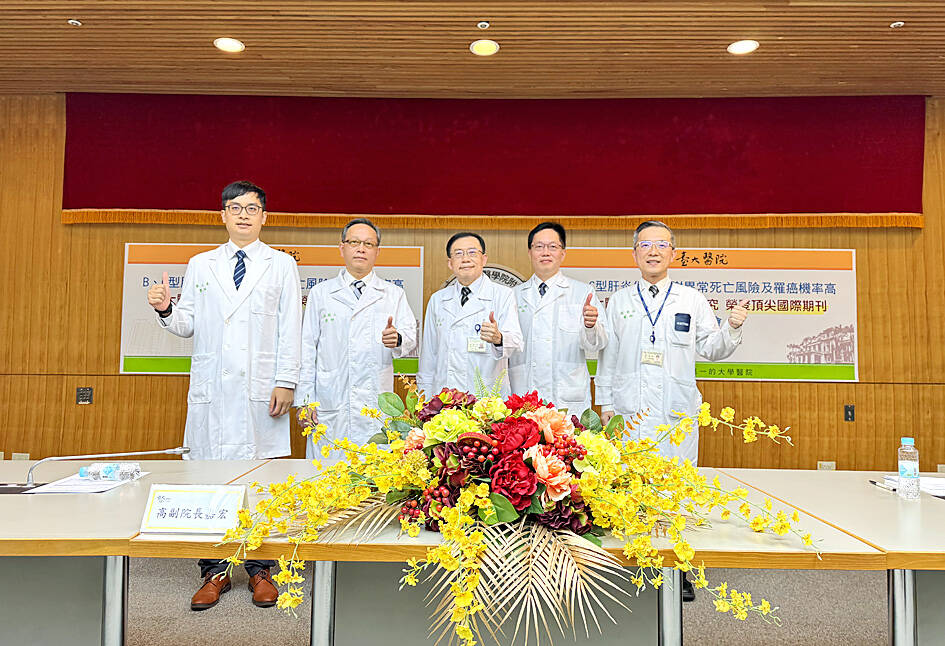Research conducted by a local hospital has found that hepatitis B patients with a simple fatty liver have a lower mortality risk than those without, suggesting that excessive fat in the liver could play a protective role against hepatitis B by potentially inhibiting viral replication.
“Hepatitis B affects more than 300 million people worldwide and is a leading cause of liver cirrhosis and liver cancer,” National Taiwan University Hospital (NTUH) Department of Internal Medicine clinical assistant professor Su Tung-Hung (蘇東弘) said at a news conference at NTUH on Wednesday.
Su added that an estimated 2 million people in Taiwan are carriers of chronic hepatitis B, a viral liver disease which can be transmitted through blood, bodily fluids or from mother to child.

Photo: CNA
While acute hepatitis B has no specific treatment and chronic hepatitis B can be managed with oral antiviral medications, there is still no highly effective treatment for hepatitis B in general, NTUH Bei-Hu Branch’s Department of Gastroenterology and Hepatology attending physician Huang Shang-chin (黃上秦) said.
Su said many chronic hepatitis B carriers in Taiwan also have metabolic dysfunction, including diabetes, hypertension, obesity and fatty liver disease, due to dietary habits and lifestyles becoming increasingly Westernized in recent years.
As the long-term impact of metabolic dysfunction and fatty liver disease on people with chronic hepatitis B has not yet been fully understood, the NTUH hepatitis research team conducted a study using long-term monitoring data collected by the hospital from 2006 to 2021 and analyzed more than 10,000 hepatitis B patients, he said.
The study, published in Journal of Hepatology in December last year, found that chronic hepatitis B patients with metabolic dysfunction had a significantly higher all-cause mortality rate, with the risk increasing as the number of metabolic disorders increased, Su said.
People with three or more metabolic dysfunctions face more than double the all-cause mortality risk compared with those without any metabolic dysfunctions, he added.
Among metabolic dysfunctions, diabetes poses the greatest threat to hepatitis B patients. Those who have HbA1c (glycated hemoglobin) levels that exceed 8 percent have a liver disease-related mortality risk four times higher than those with levels below 6 percent, Su said.
An unexpected finding in the study was that hepatitis B patients who only had simple fatty liver disease had about 50 percent lower all-cause mortality risk compared with hepatitis B patients who had neither fatty liver disease nor cardiometabolic-related issues, he said.
“Those [excessive] fats may have an inhibitory effect on the replication of the hepatitis B virus,” Su added.
Asked whether deliberately inducing simple fatty liver in patients could be a potential strategy to combat hepatitis B, Huang said that it is not easy to do, as most cases of fatty liver are accompanied by a metabolic syndrome.
“It is impossible for us to clinically control for a condition where a patient develops simple fatty liver without metabolic dysfunctions,” he added.
However, with further experiments and research on why simple fatty liver can suppress or even clear the hepatitis B virus, researchers might be able to identify the underlying mechanisms, Huang said.
“If we can pinpoint those mechanisms, there is potential to develop targeted medicines based on them,” he added.

Taiwan is to have nine extended holidays next year, led by a nine-day Lunar New Year break, the Cabinet announced yesterday. The nine-day Lunar New Year holiday next year matches the length of this year’s holiday, which featured six extended holidays. The increase in extended holidays is due to the Act on the Implementation of Commemorative and Festival Holidays (紀念日及節日實施條例), which was passed early last month with support from the opposition Chinese Nationalist Party (KMT) and Taiwan People’s Party. Under the new act, the day before Lunar New Year’s Eve is also a national holiday, and Labor Day would no longer be limited

Taiwan is to extend its visa-waiver program for Philippine passport holders for another year, starting on Aug. 1, Minister of Foreign Affairs Lin Chia-lung (林佳龍) said on Friday. Lin made the announcement during a reception in Taipei marking the 127th anniversary of Philippine independence and the 50th anniversary of the establishment of the Manila Economic and Cultural Office (MECO) in Taiwan, the Ministry of Foreign Affairs said. The decision reflected Taiwan’s commitment to deepening exchanges with the Philippines, the statement cited Lin as saying, adding that it was a key partner under the New Southbound Policy launched in 2016. Lin also expressed hope

Costa Rica sent a group of intelligence officials to Taiwan for a short-term training program, the first time the Central American country has done so since the countries ended official diplomatic relations in 2007, a Costa Rican media outlet reported last week. Five officials from the Costa Rican Directorate of Intelligence and Security last month spent 23 days in Taipei undergoing a series of training sessions focused on national security, La Nacion reported on Friday, quoting unnamed sources. The Costa Rican government has not confirmed the report. The Chinese embassy in Costa Rica protested the news, saying in a statement issued the same

Temperatures in New Taipei City’s Sindian District (新店) climbed past 37°C yesterday, as the Central Weather Administration (CWA) issued heat alerts for 16 municipalities, warning the public of intense heat expected across Taiwan. The hottest location in Taiwan was in Sindian, where the mercury reached 37.5°C at about 2pm, according to CWA data. Taipei’s Shilin District (士林) recorded a temperature of 37.4°C at noon, Taitung County’s Jinfeng Township (金峰) at 12:50 pm logged a temperature of 37.4°C and Miaoli County’s Toufen Township (頭份) reached 36.7°C at 11:40am, the CWA said. The weather agency yesterday issued a yellow level information notice for Taipei, New